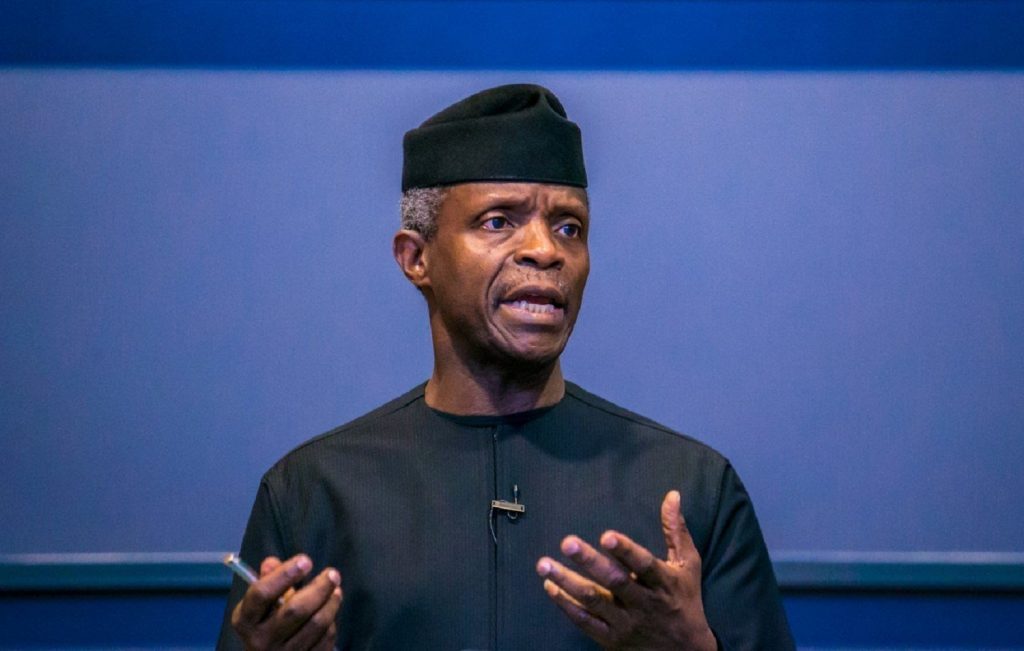VP Osinbajo Hails Supreme Court’s Judgement Endorsing Virtual Proceedings

The recent Supreme Court judgement endorsing virtual court proceedings
was the focus of the Vice President, Prof Yemi Osinbajo, SAN, who in
his presentation as Keynote Speaker at a webinar said: “Our system of
justice, another catastrophic round of technical decisions around the
constitutionality of virtual proceedings.” The Vice President stated
this last Thursday at a webinar on media coverage of virtual court
proceedings in Nigeria, organised by the Gavel International Ltd.
According to Prof. Osinbajo, “We are at a point where at least, we
know that virtual hearings are legal. This means that the Supreme
Court is satisfied that appropriate means can be found to ensure that
hearings are public, and that the press and indeed, members of the
public, can access the proceedings”.
“I think that an opportunity that this offers us, is to get rid of
this issue of technicality as much as possible. And, I am so pleased
that the Supreme Court did not even hesitate in saying that virtual
proceedings are legal. It is really a breath of fresh air, considering
the ways that we tend to magnify the issue of technicality to the
point where you wonder where justice is.”
Continuing, the Vice President said “I am hoping that the opportunity
we have in virtual proceedings will also be an opportunity to dispense
with several of the unnecessary technical rules that we have in our
adjectival law, laws of procedure, evidence and all that. And
hopefully, we are able to get to the heart of trials and the heart of
the matter such that we are not bugged down unnecessarily by
technicality”.
“Reporting of court proceedings is a crucial exercise of the right to
fair hearing, a cornerstone of which is that hearings must be held in
public. How that right will be given full expression when court
proceedings are within the encrypted confines of virtual platforms, is
really the subject of our conversion today.”
The Attorneys-General of Lagos and Ekiti States deserve our
commendation, for bringing the matter before the Supreme Court. They
asked the court to determine whether having regard to the
constitutional requirement that court proceedings save for some
exceptions must be held in public, and whether court hearings by the
use of technology, by remote hearings of any kind, whether Zoom or
WhatsApp, Microsoft Themes, Skype or any other audio-visual or
video-conference platform, are constitutional.
The Supreme Court while dismissing the suit themselves as premature
and speculative, nevertheless, said that as things stood today,
virtual proceedings were constitutional. This wise approach of the
Court probably saved our system of justice another catastrophic round
of technical decisions, around the constitutionality of virtual
proceedings.
It may also be cautiously taken as a signal that the Supreme Court
expects the lower courts to go down this new path, with as little
attention to technicality as possible.
So, we are at a point where at least, we know that virtual hearings
are legal. This means that the Supreme Court is satisfied that
appropriate means can be found to ensure that hearings are public, and
that the press and indeed, members of the public can access the
proceedings.
Just as the physical court can only sit a determined number of
persons, so the virtual court, depending on the platform being used,
would probably have a stated number of persons who can access the
proceedings.
Practice directions may have to indicate how, and in what order
invitations would be issued especially to the public.
In 2018, a British court jailed for 18 months, the chair of the UK
legal defence league, Mr Stephen Yaxley-Lennon (Tommy Morrison). Now,
here is a man who was broadcasting on social media outside of Crown
Court in Leeds in the UK, where a trial was taking place. He was
accused of broadcasting live, and within hours of this broadcast, over
half a million people had viewed the broadcast, and the court felt
that his actions could have cost it over hundreds of thousands of
pounds in re-running the trial, because of the prejudice that was
introduced by reporting the case live, in the manner that he did.
Moderated by Dr. Rueben Abati of Arise TV and Shola Soyele of Channels
TV, the webinar also had critical interventions from discussants which
included Chief Wole Olanipekun, SAN who was represented by his son, Mr
Bode Olanipekun, SAN, Deacon Dele Adesina, SAN, Mr Richard Akinola and
Dr Chidi Odinkalu.

